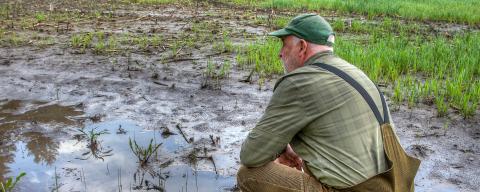UNH Extension Agricultural Disaster Response 2023
The 2023 production season was extremely challenging for farmers throughout the northeast. Widespread freeze events in February and May caused the greatest fruit crop loss in over 50 years. Stone fruits including peaches, sweet cherries and plums were lost to the February freeze where temperatures plummeted to -21F in the coldest parts of New Hampshire. Next came a second major freeze event occurring on May 18th during the peak of apple bloom for much of the state. Open blossoms were at their most susceptible stage, and over 1,000 acres of fruit crops were heavily impacted.
Consulting with partner organizations including the NH Department of Agriculture and USDA Farm Service Agency, UNH Extension recognized the need for action. Within a matter of weeks, Extension Specialists leveraged relationships with partner organizations and growers to distribute a crop loss survey which captured estimated damage levels on 70 farms representing over 1,000 acres. Growers estimated the economic impact of lost crop value of these two events at over $10 million in this survey. The damage from the freeze events was acute and obvious, but the story does not end there.
Crop diversification has been a risk management strategy adopted by the majority of N.H. farms. This year, many of the farms impacted by freeze damage in fruit crops turned to managing their vegetable crops in hopes of salvaging the season. 2023 turned out to be the wettest year on record, which dates back 129 years, according to the National Weather Service in Gray, Maine. This created many additional challenges for farmers in the state including poor seed germination, added plantings and additional input costs, increased incidence of plant diseases, field accessibility issues, delayed timing of critical field operations, extra labor required to hand harvest, food safety concerns resulting from flooded fields and delayed ripening of produce. Further, nutrient leaching beyond the root zone resulted in reduced soil fertility and crop yields, along with increased costs to replace eroded soil nutrients. Soil compaction and erosion ranged from moderate to extreme. Poor weed control due to inaccessibility with equipment will result in increased weed pressure and control costs in future years.
A second survey targeting the impacts of excessive moisture and flooding on vegetable crops was conducted by Extension near the end of harvest, capturing responses from growers representing another 1,000 acres. This participation rate represents just over one quarter of the vegetable production acreage in New Hampshire, according to the latest USDA Agriculture Census. Reported loss estimates totaled over $3 million.
Forage and Livestock producers were often unable to access fields, reducing grazing space and forage yields needed to feed animals throughout the year. In addition to many of the challenges vegetable growers faced, the wet conditions also created challenges with feed storage, potential for mold and yeast growth, and reduced forage quality. Many NH farms saw increased feed costs from replacing lost forage and supplementing poorer quality forage. Extension conducted a Field Crop and Forage Loss survey to capture the impacts of the 2023 weather events on NH producers, which accounted for over 5,000 impacted acres. New Hampshire producers reported revenue losses of $1.4 million, and additional purchased feed costs of $750,000.
Beginning in February after the first freeze event, Extension Specialists began sharing crop damage assessments with USDA Farm Service Agency, NH Department of Agriculture, and state and federal decisionmakers. Our work contributed to the approval of Secretarial Disaster Declarations for impacted counties in the state, which unlocks low-interest emergency loans available through Farm Service Agency. More importantly, these declarations are a key consideration when additional federal disaster relief funding is sought. Extension met with each U.S. senator and congressional representative directly or with staffers, as well as Governor Sununu, to provide updates, and educate them about the impacts and need for relief funding. Senator Jeanne Shaheen brought information we provided her directly to the senate floor while advocating for federal disaster relief for NH farmers.
UNH Extension continues to serve in an educational role to educate legislators and agricultural service providers on the impacts of severe weather events on NH agriculture in 2023 and develop programming to help producers be as prepared as possible in the future.
Extension Services & Tools That Help NH Farmers Grow
Newsletters: Choose from our many newsletters for production agriculture
Receive Pest Text Alerts - Text UNHIPM to (866) 645-7010



